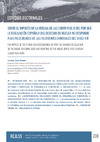Identificador persistente para citar o vincular este elemento:
https://accedacris.ulpgc.es/jspui/handle/10553/114366
| Título: | Sobre el impacto de la huelga en las contratas o del por qué la regulación española del derecho de huelga no responde a las necesidades de las relaciones laborales del siglo XXI | Otros títulos: | The impact of the strike on outsourcing or why the spanish regulation of the right to strike does not respond to the needs ofthe 21st century labor relations | Autores/as: | Grau Pineda, Carmen | Clasificación UNESCO: | 560504 Derecho constitucional 6306 Sociología del trabajo 560503 Derecho mercantil |
Palabras clave: | Derecho de huelga Conflicto colectivo Contratas y subcontratas de obras y servicios Esquirolaje Jusisprudencia, et al. |
Fecha de publicación: | 2022 | Publicación seriada: | Revista De Estudios Jurídico Laborales Y De Seguridad Social (Rejlss) | Resumen: | La premisa básica según la cual pensar que las empresas conservan intactas sus facultades empresariales y que, por tanto, pueden reaccionar frente a la huelga como mejor consideren dentro de la libertad de empresa que les garantiza el art. 38 CE, tiene como límite constitucional la integridad del derecho fundamental de huelga que exige que las empresas afectadas, principales o no, soporten la inactividad que encuentra causa en el paro (ex art. 28.2 CE). En consecuencia, el respeto de este derecho fundamental se puede exigir frente a cualquier vulneración y ello no solo frente al empresario sino frente a cualquier otro sujeto que resulte responsable, con independencia del tipo de vínculo que le una al empresario (ex art. 177.4 LJS)-, admitiendo, de este modo, posibles lesiones procedentes de una “especial vinculación” interempresarial sea laboral como mercantil, como se tendrá ocasión de analizar en las sentencias que se comentan en la presente aportación. The basic premise according to which to think that companies retain their business powers intact and that, therefore, they can react to the strike as they deem best within the freedom of business guaranteed by art. 38 CE, has as constitutional limit the integrity of the fundamental right to strike, which requires that the affected companies, main or not, bear the inactivity that is caused by the strike (ex art. 28.2 CE). Consequently, respect for this fundamental right can be demanded against any violation and this not only against the employer but against any other subject who is responsible, regardless of the type of bond that binds the employer (ex art. 177.4 LJS) -, thus admitting possible injuries arising from a "special relationship" between companies, whether labor or commercial, as will be analyzed in the judgments discussed in this contribution. |
URI: | https://accedacris.ulpgc.es/handle/10553/114366 | ISSN: | 2660-437X | DOI: | 10.24310/rejlss.vi4.14055 | Fuente: | Revista de Estudios Jurídico Laborales y de Seguridad Social (REJLSS) [ISSN 2660-437X ], n. 4, p. 208-230 |
| Colección: | Artículos |
Visitas
374
actualizado el 15-ene-2026
Descargas
133
actualizado el 15-ene-2026
Google ScholarTM
Verifica
Altmetric
Comparte
Exporta metadatos
Los elementos en ULPGC accedaCRIS están protegidos por derechos de autor con todos los derechos reservados, a menos que se indique lo contrario.
